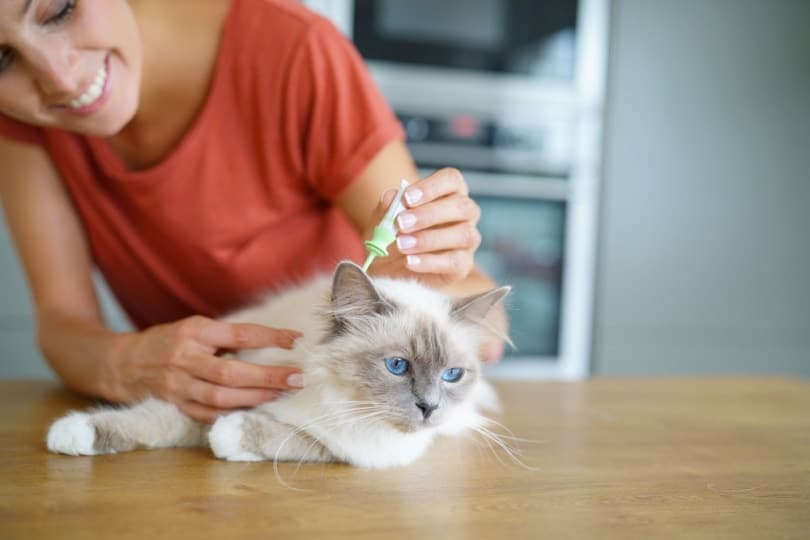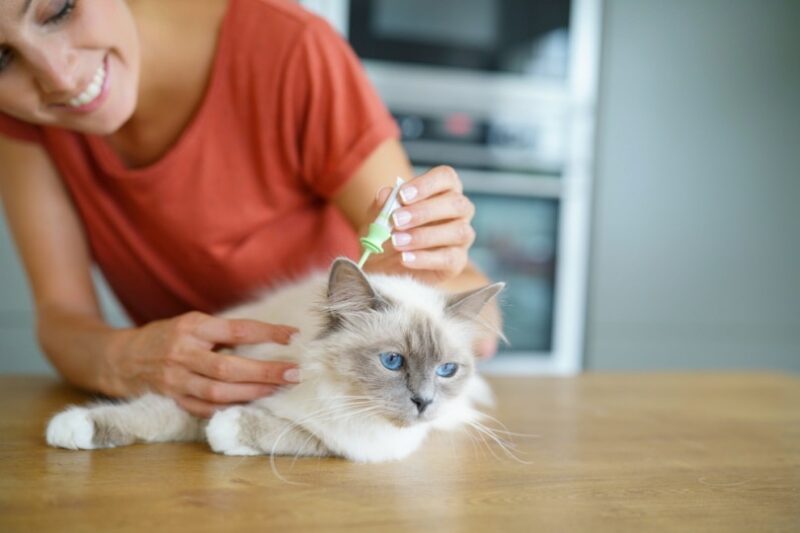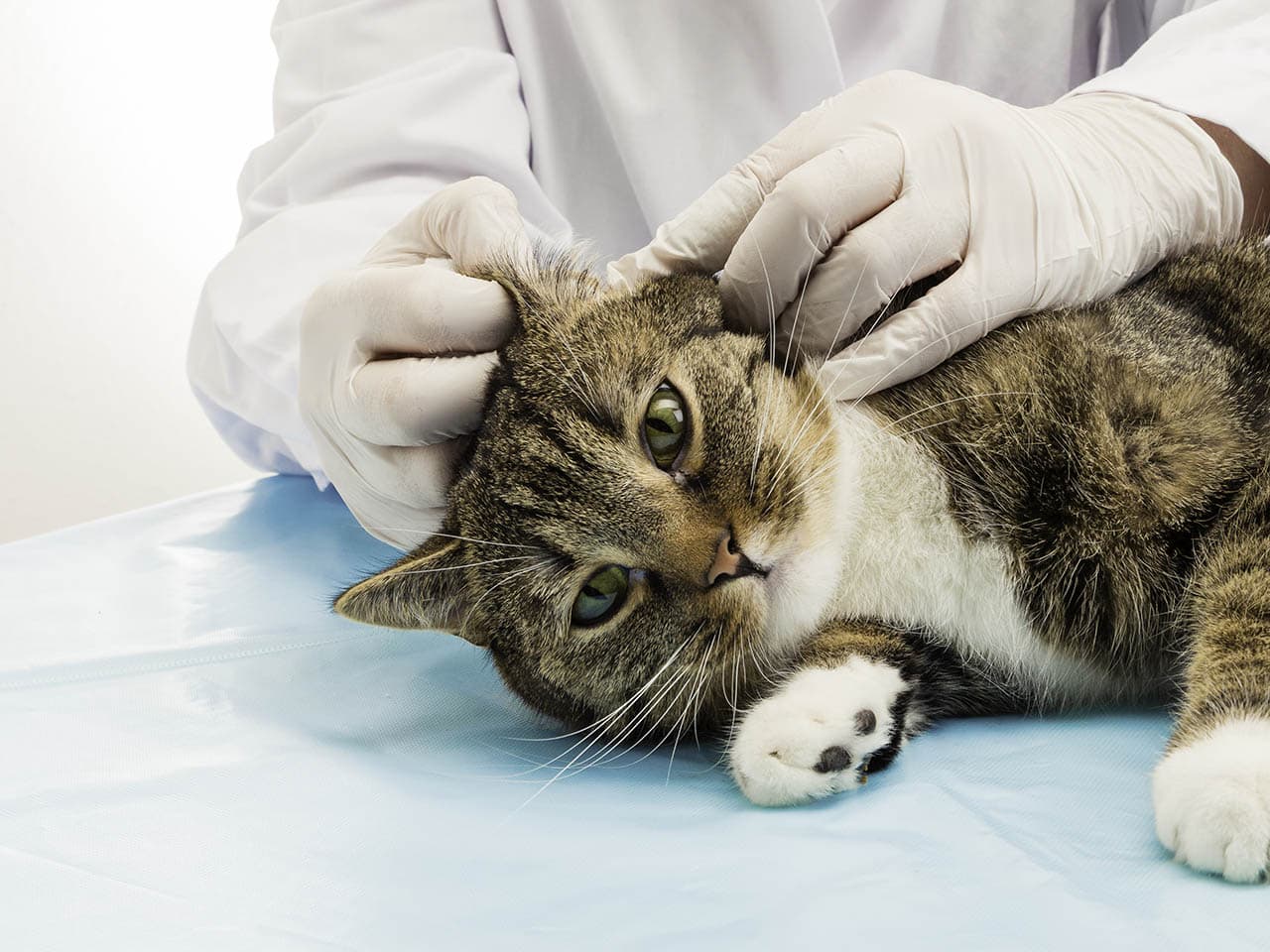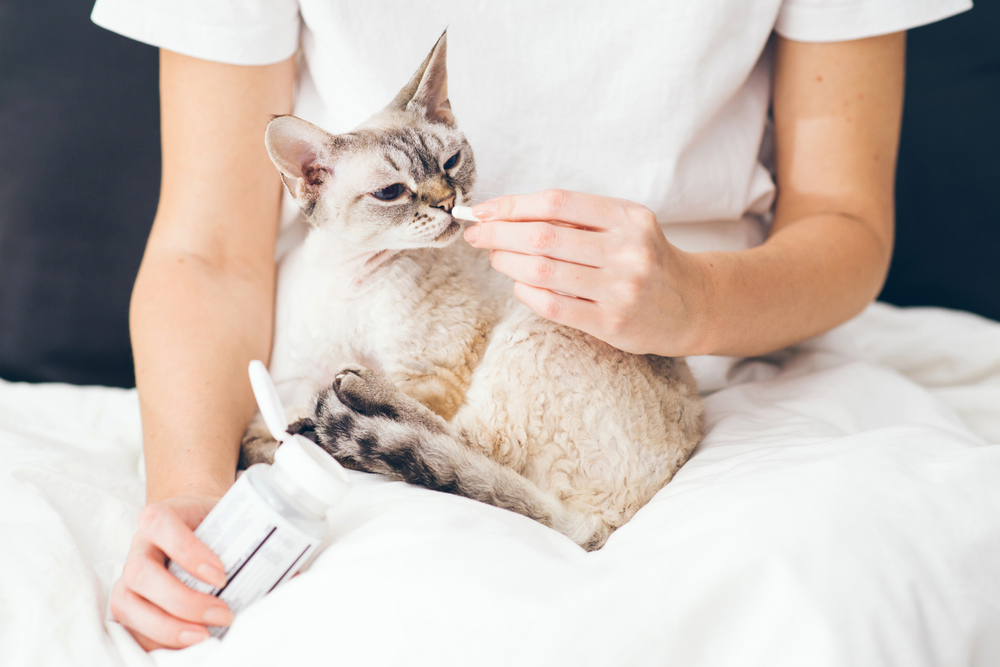Click to Skip Ahead
Fleas. All cat owners want to keep their feline flea-free. No one wants fleas in their house, and getting rid of them can be a frustrating battle if you do have them. What are your options for treating fleas in cats? Thankfully, there are a few things that you can do to keep fleas off your cat!
What Happens to a Cat When They Have Fleas?
Fleas are external skin parasites. They like to live on your pets, although they won’t say no to biting you occasionally. When fleas lay eggs, the eggs fall off your cat’s body and into the environment. That can mean your cat’s bed, your bed, the carpet—just about anywhere.
Skin Conditions
When fleas bite your cat, your cat is exposed to their saliva. Many animals are allergic to these bites and develop severe pruritus or itching. Depending on the extent of the scratching, your cat could lose hair or even develop secondary bacterial infections. We often call the condition flea allergy dermatitis.
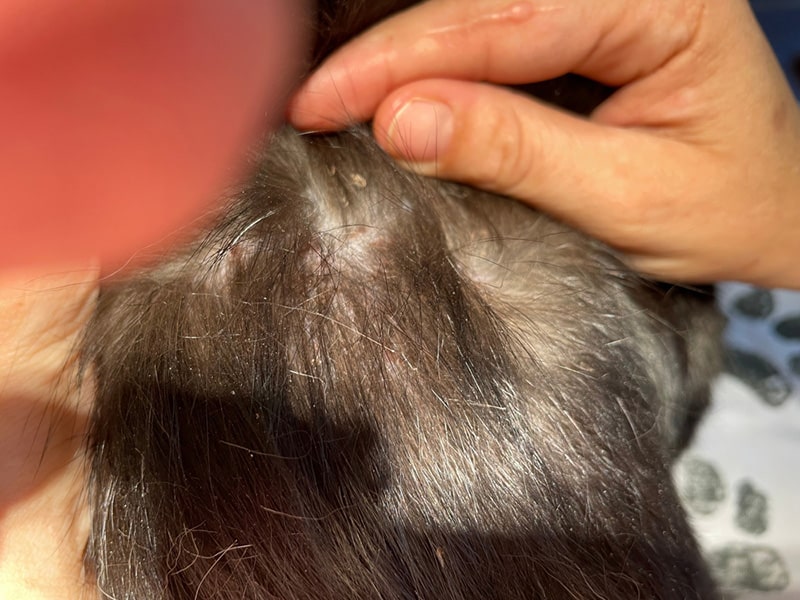
Diseases
External parasites can transmit a variety of diseases, and fleas are no exception. Your cat can become infected with tapeworms if they ingest a flea, usually when grooming. Other health diseases of concern include:
- Anemia: Caused by the fleas feeding on your cat’s blood
- Feline infectious anemia: Caused when a microscopic parasite from fleas attaches to your cat’s red blood cells and is destroyed
- Cat scratch fever: Can be passed on to people as a zoonotic condition
Determining if Your Cat Has Fleas
You may be able to find fleas on your cat just by looking them over, but this is easier said than done. Most cats groom themselves regularly, so finding a flea is challenging. You can use a flea comb to find fleas, as well as “flea dirt” or flea feces.

Types of Prevention
Cats are not small dogs. That simple fact is vital for you to keep in mind. Applying your dog’s flea prevention product to your cat can be dangerous, even downright deadly. Stick to a reliable product that is formulated for cats. You should talk to your veterinarian about any product before you use it, as some products are contraindicated in cats with seizures because they lower the seizure threshold.
1. Topicals
Topical products are some of the most effective and broadest spectrum. They are applied to the back of the neck and allowed to dry. Some cats are sensitive to the application and lose hair at the application site.
Revolution Plus
Revolution Plus is one of the best products on the market. In one tube, it protects against fleas, ticks, heartworms, ear mites, roundworms, and hookworms. You get internal and external parasite protection. It lasts for a month.
| Active ingredients: | Sarolaner, Selamectin |
| Sizes: | 2.8–5.5 lbs; 5.6–11 lbs; 11.1–22 lbs |
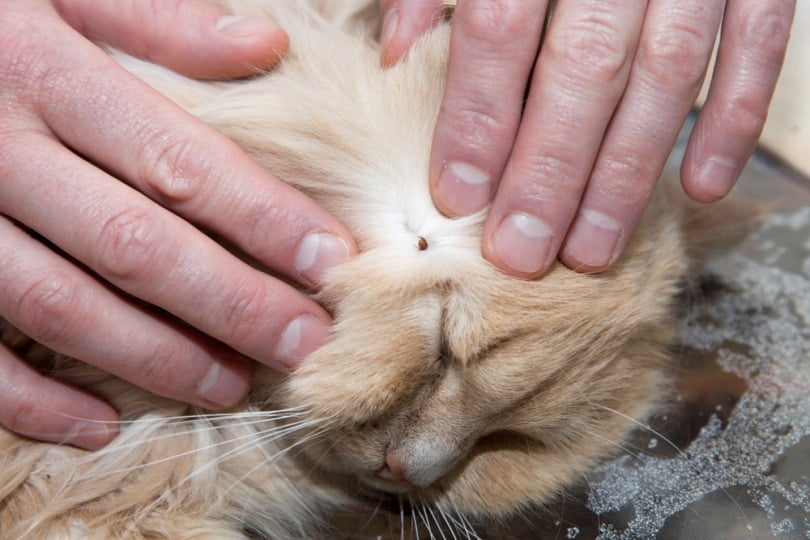
Revolution
Revolution has been out even longer than Revolution Plus. The advantage of this monthly product is that it is in tiny kittens as the weight range for the smallest size is 0–5 pounds. The protection profile is similar to Revolution Plus, except the tick protection is off-label.
| Active ingredients: | Selamectin |
| Sizes: | 0–5 lbs; 5.1–15 lbs; 15.1–22 lbs |
Advantage Multi
Advantage Multi is another broad-spectrum product. It offers protection against fleas, heartworms, ear mites, roundworms, and hookworms. It’s also a one-month administration.
| Active ingredients: | imidacloprid, moxidectin |
| Sizes: | 2–5 lbs; 5.1–9 lbs; 9.1–18 lbs |

Bravecto
Bravecto is one of the best options for convenience. It kills fleas and ticks for 12 weeks after application of this topical product. Note that it doesn’t offer heartworm protection.
| Active ingredients: | Fluralaner |
| Sizes: | 2.2–6.2 lbs; 6.2–13.8 lbs; 13.8–27.5 lbs |
Revolt
Revolt tends to be a less expensive option for flea and heartworm protection. It has virtually the same protection as Revolution Plus and lasts 30 days.
| Active ingredients: | Selamectin |
| Sizes: | 0–5 lbs; 5.1–15 lbs; 15.1–22 lbs |
Advantage XD
Advantage XD is an excellent product to consider for two reasons: it kills fleas for two months and has a size for large cats, so you don’t have to apply multiple sizes.
| Active ingredients: | spinetoram |
| Sizes: | 1.8–9 lbs; over 9 lbs |
2. Oral
Some cats do very well with oral flea prevention products. If your cat has a history of seizures, you must speak to your veterinarian to see if these options are safe for your dog.
Credelio
Credelio is a newer kid on the market. It has a yeast and vanilla flavor that most cats love, so it is highly palatable. It protects against fleas and ticks for a month.
| Active ingredients: | lotilaner |
| Sizes: | 2.0–4.0 lbs, 4.1–17 lbs |

Capstar
Capstar lasts only 24 hours, but it’s fast at killing fleas when you’re in a bind. You can give it repeatedly, but the best plan is to get a jumpstart on getting rid of fleas and transitioning to a longer-acting product.
| Active ingredients: | nitenpyram |
| Sizes: | 2–25 lbs |
3. Collars
There are a lot of flea collars on the market, but many of them are relatively ineffective.
Seresto
Seresto is not just effective as a flea and tick prevention product. It’s also pretty affordable when you see it provides your cat with eight months of protection from these external parasites.
| Active ingredients: | Flumethrin, imidacloprid |
| Sizes: | One size collar for cats and kittens |
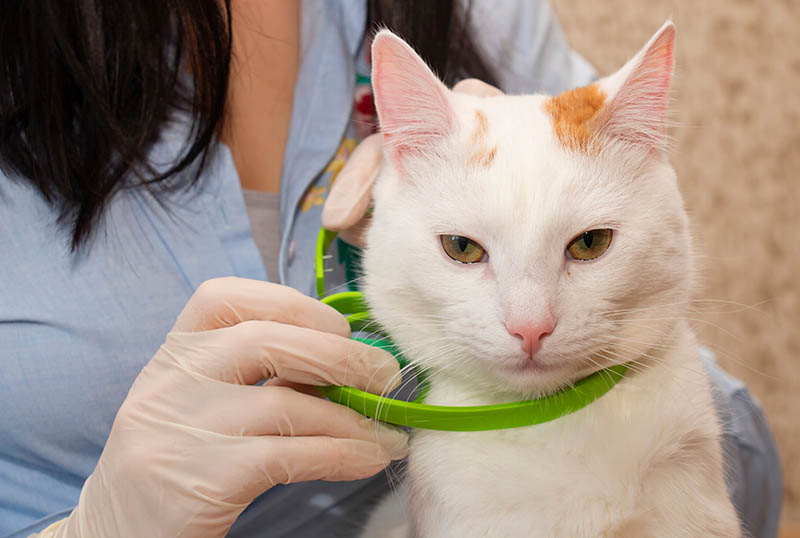
Considerations for Choosing a Flea Prevention Product
You’ll want to pick a product that is both safe for your cat and effective. Are you able to give a pill or apply a topical?
Talk with your veterinarian when you’re looking at your options, as they should be able to make a recommendation that’s best for your cat. Try to avoid “home remedies” for fleas, such as garlic powder or essential oils, unless your veterinarian gives you the go-ahead. Some essential oils, like peppermint oil, can drive bugs away, but many essential oils are toxic to pets.
Frequently Asked Questions (FAQ)
How do you apply flea prevention to your cat?
If you’re using a topical flea prevention product, apply it to the back of your cat’s neck. Part the hairs so it goes down their skin and make a line of the liquid. Allow the product to dry before letting your pets play together.
Can you combine different flea treatment options?
You should only combine flea prevention products if your veterinarian recommends it. Don’t combine two oral products or two topical products because you could create a toxic exposure.
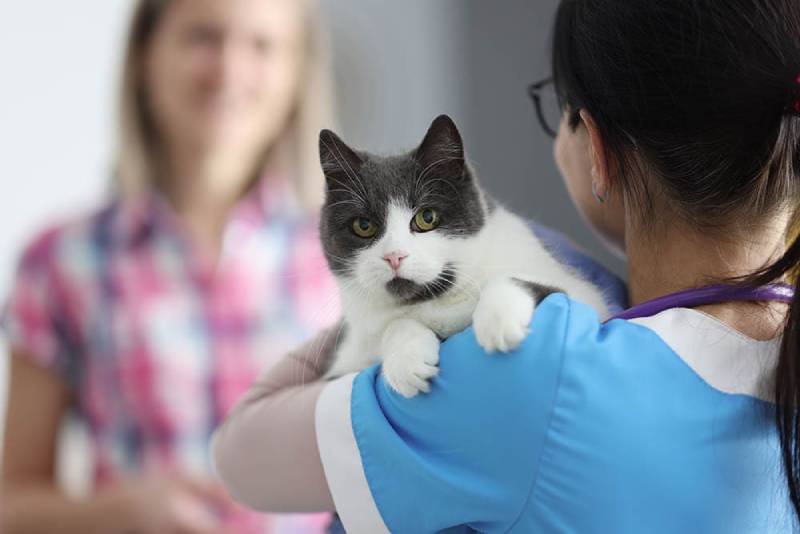
Can you use out-of-date flea prevention in or on your cat?
You should not use expired flea prevention on your cat. The chemicals could break down past the expiration date, making them ineffective or potentially dangerous to your cat. Speak to your vet about options if one product doesn’t work.
Conclusion
No one likes fleas. Finding the best flea prevention for your cat can be very challenging. Work with your veterinarian to decide if you need flea, tick, and heartworm protection.
Featured Image Credit: goodluz, Shutterstock

